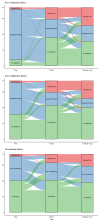Effectiveness of Open-Ended Psychotherapy Under Clinically Representative Conditions
- PMID: 32508685
- PMCID: PMC7251147
- DOI: 10.3389/fpsyt.2020.00384
Effectiveness of Open-Ended Psychotherapy Under Clinically Representative Conditions
Abstract
Objective: This study investigates the effectiveness of open-ended psychotherapy in a large, naturalistic, and diverse patient cohort using rigorous and multifaceted assessments.
Method: Patients (N = 370) in open-ended psychotherapy completed an extensive set of self-report measures and diagnostic interviews, including long-term follow-up in order to assess stability of outcomes. About half of the patients qualified for a personality disorder at the onset of treatment. Treatments were open-ended, and on average therapists provided substantially larger treatment doses than common in the literature.
Results: A substantial majority recovered from their respective Axis I (58%) and/or Axis II (55%) disorders during treatment. Patients also experienced large positive changes in self-report measures of overall psychiatric symptoms and moderate positive changes in self-reported interpersonal problems, while very few (< 3%) demonstrated negative development. The patients maintained their diagnostic and self-assessed changes at a two-and-a-half-year follow-up. In contrast, self-reported occupational functioning showed minimal improvement throughout the treatment and follow-up phase.
Conclusion: A naturalistic patient cohort undergoing open-ended psychotherapy demonstrates substantial and stable improvements.
Keywords: effectiveness; naturalistic; outcome; psychotherapy; representative.
Copyright © 2020 Nordmo, Sønderland, Havik, Eilertsen, Monsen and Solbakken.
Figures
References
-
- Lambert MJ. The efficacy and effectivness of Psychotherapy. In: Lambert MJ, editor. Bergin and Garfield"s Handbook of Psychotherapy and Behavior Change, 6th edition N.J. Hoboken: John Wiley & Sons; (2013). p. 93–139.
LinkOut - more resources
Full Text Sources






